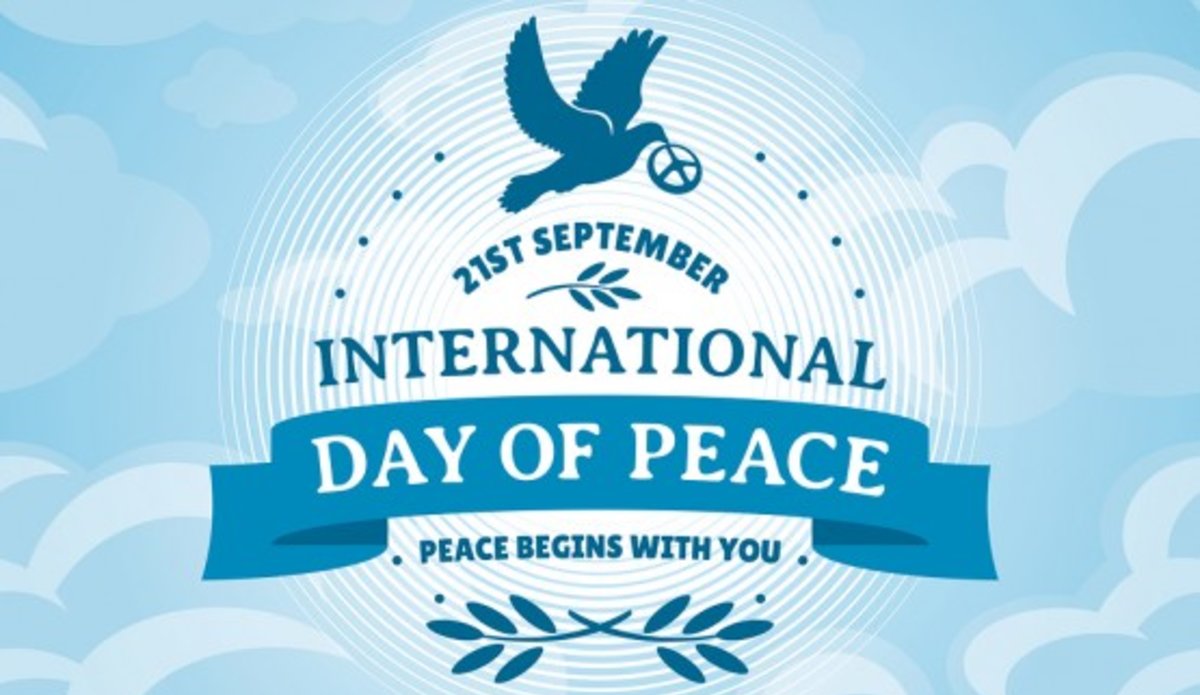"When you make peace with yourself, you make peace with the world"
(Maha Ghosananda, Cambodian monk, follower of Theravada Buddhist teachings)
Lecturer at the Department of Psychology of the Dnipro Institute of PrJSC HEI "IAPM", legal expert, psychologist at the Amur-Nyzhnodniprovskyi District Department of the State Institution "Probation Center" branch in Dnipropetrovsk Oblast, member of the International Association of Psychologists and Counselors for Sexual Education Eduard Abashia informs about the following. The International Day of Peace, sometimes unofficially known as World Peace Day, was established in 1981 by the United Nations General Assembly and is observed annually on September 21. It is dedicated to world peace, particularly the absence of war and violence, which can be brought about by a temporary ceasefire in a combat zone to allow access for humanitarian aid.
To honor this day, the UN Peace Bell is rung at the UN Headquarters in New York. The Peace Bell, cast from coins collected by children from 60 countries around the world, bears a simple but powerful message: "Long live absolute world peace". The bell was gifted to the UN by Japan in 1954 and now rings twice a year: once on the spring equinox and again on the International Day of Peace. The UN Secretary-General personally rings the Bell to symbolically declare peace to the world. On this day, the UN calls on all countries to temporarily halt military actions and cease violence, even if only for 24 hours. This symbolic step emphasizes that only through peaceful dialogue and negotiations can sustainable progress and benefits for humanity be achieved. Wars and aggression cannot be means of resolving conflicts; they only bring grief and destruction.

War and peace in light of the Holy Scripture tell us about the spiritual battle that began with the fall of angels and ends with Christ's victory in the Resurrection. But this is a battle in which the opponents are spirits of evil, not people. And the only weapon given to a Christian, the spiritual sword, is the Word of God (Ephesians 6:10-18).
As written in the New Testament: "There is no one righteous, not even one; there is no one who understands; there is no one who seeks God. All have turned away, they have together become worthless; there is no one who does good, not even one. Their throats are open graves; their tongues practice deceit. The poison of vipers is on their lips. Their mouths are full of cursing and bitterness. Their feet are swift to shed blood; ruin and misery mark their ways, and the way of peace they do not know. There is no fear of God before their eyes." Now we know that whatever the law says, it says to those who are under the law, so that every mouth may be silenced and the whole world held accountable to God. Therefore no one will be declared righteous in God's sight by the works of the law; rather, through the law we become conscious of our sin (Romans 3:10-20). But now apart from the law the righteousness of God has been made known, to which the Law and the Prophets testify. This righteousness is given through faith in Jesus Christ to all who believe. There is no difference between Jew and Gentile, for all have sinned and fall short of the glory of God, and all are justified freely by his grace through the redemption that came by Christ Jesus. God presented Christ as a sacrifice of atonement, through the shedding of his blood—to be received by faith. He did this to demonstrate his righteousness, because in his forbearance he had left the sins committed beforehand unpunished—he did it to demonstrate his righteousness at the present time, so as to be just and the one who justifies those who have faith in Jesus (Romans 3:21-26).
In the Bible, the words "peace" and "tranquility" are used in different ways. Sometimes they refer to the state of friendship between God and man. This peace between the holy God and sinful humanity was achieved through Christ's sacrificial death, "making peace through his blood, shed on the cross, to reconcile to himself all things, whether things on earth or things in heaven" (Colossians 1:20).
Furthermore, as High Priest, the Lord Jesus maintains this state of friendship on behalf of all "who come to God through him, because he always lives to intercede for them" (Hebrews 7:25). This is a prerequisite for the second kind of peace, which sometimes refers to peace of mind.
"You, my brothers and sisters, were called to be free. But do not use your freedom to indulge the flesh; rather, serve one another humbly in love. For the entire law is fulfilled in keeping this one command: "Love your neighbor as yourself." If you bite and devour each other, watch out or you will be destroyed by each other. So I say, walk by the Spirit, and you will not gratify the desires of the flesh. For the flesh desires what is contrary to the Spirit, and the Spirit what is contrary to the flesh. They are in conflict with each other, so that you are not to do whatever you want. But if you are led by the Spirit, you are not under the law. The acts of the flesh are obvious: sexual immorality, impurity and debauchery; idolatry and witchcraft; hatred, discord, jealousy, fits of rage, selfish ambition, dissensions, factions and envy; drunkenness, orgies, and the like. I warn you, as I did before, that those who live like this will not inherit the kingdom of God" (Galatians 5:13-21).
Only when "we have peace with God through our Lord Jesus Christ" (Romans 5:1), can we experience true peace of mind, which is the fruit of the Holy Spirit - in other words, His fruit manifested in us (Galatians 5:22-23).
In Isaiah 26:3, it is written that God will keep us in "perfect peace" if we trust Him, meaning our mind relies on Him, focuses on Him, and trusts Him. Our peace of mind is "perfect" or imperfect to the extent that we focus on God, rather than on ourselves or our problems. We experience peace if we believe what the Bible says about God's closeness, as in Psalm 138:1-12, about His goodness and power, His mercy and love for His children, and His complete control over all life circumstances.
Peace is experienced as a result of prayer. "Do not be anxious about anything, but in every situation, by prayer and petition, with thanksgiving, present your requests to God. And the peace of God, which transcends all understanding, will guard your hearts and your minds in Christ Jesus" (Philippians 4:6-7).
Peace for the mind and heart comes from realizing that the wise and loving Father has a purpose in our trials. "And we know that in all things God works for the good of those who love him, who have been called according to his purpose" (Romans 8:28).
God can bring many good things into our lives, including peace, from the sufferings we experience. Even the Lord's discipline will produce "a harvest of righteousness and peace" in our lives (Hebrews 12:11). These sufferings provide a new opportunity to put our hope in God and ultimately glorify Him (Psalm 42:5). They help us comfort others when they undergo similar trials (2 Corinthians 1:4), and they are "light and momentary troubles" compared to the "eternal glory that far outweighs them all" (2 Corinthians 4:17).
Peace of mind is only available when we find true peace with God through Christ's sacrifice on the cross as payment for our sins. For Christians, peace of mind is available through deep knowledge and complete trust in God, Who "will meet all your needs according to the riches of his glory in Christ Jesus" (Philippians 4:19).
People's lives sometimes reveal unique truths, although they manifest in the most ordinary ways. In 2006, former Chilean dictator Augusto Pinochet died at the age of 91. A year before his death, the former leader of the Chilean Communist Party, 90-year-old Luis Corvalán, who had fought against Pinochet all his life, stated that he would outlive Pinochet as a matter of principle.
And so the day came when, it seemed, the long-held wish had come true, but Corvalán unexpectedly confessed: "I was terribly surprised when I was informed that Pinochet was no more. When the greatest enemy of your life dies, there's a vague feeling that something is missing... I had been waiting for this for so many years, and now suddenly it has happened... and what next?"
Imagine: hating your opponent all your life, fighting against them, and after their death suddenly realizing that you've gained absolutely nothing, haven't won at all, but on the contrary, seem to have lost the only meaning of your life. Do we need such a meaning? And why do we constantly harm each other, instead of giving life meaning through something pure, clear, bright, holy, so that others could draw joy and inspiration for life from us?
In a world full of evil, the Lord calls us to freedom from evil. How important it is to understand that every person is our lost brother, for we are all children of one Adam by blood, or more precisely, we are all children of one Heavenly Father. Only often we forget about this and treat each other as if we were complete strangers. No matter who a person is, no matter what misdeeds they have committed, if in the soul they are close, nothing will make us hate them. And if there is no heartfelt acceptance of the neighbor, even if they are blood relatives, hatred cannot be avoided. A harsh word or an unwelcome action will provoke the dislike that has long been lurking in that soul. It turns out: hatred precedes its causes, or rather, it seeks reasons for its justification.
Deep dislike for the shortcomings of another person or country can be born from an intuitive but unconscious feeling of one's personal spiritual inferiority, which is so evident in the person of the neighbor. After all, a person tends to hate in others what is in themselves, but what they do not want to see or acknowledge in themselves. Indeed, agree that in each of our lives there was something we are ashamed to talk about, but as soon as we learn that it happened to someone else, we immediately pass our harsh verdict.
Today in Ukrainian society, hatred, anger, aggression, and so on are felt. Be that as it may, these are the realities of our life. Whether we want it or not, the question - whether to love or hate, forgive or take revenge, come closer or push away, make peace or wage war - we will still have to decide in our lives. These decisions determine whether we are going to God, Who Himself "is Love" (1 John 4:8), or falling to His pitiful opponent, who "was a murderer from the beginning" (John 8:44). If it is true that there is no greater happiness on earth than to keep love and goodness in one's heart, then it is also true that there is no greater misfortune than to nurture anger and hatred in one's soul. We must protect our planet. And only by working together can we make our common home safe for future generations, - the psychologist noted.
We wish everyone to find true peace of mind, harmony, and achieve peace!
 Eng
Eng  Укр
Укр 